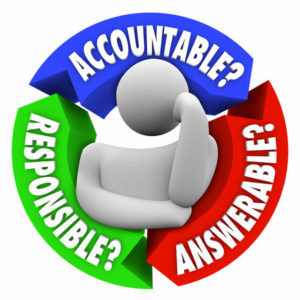By Rose O. Sherman, EdD, RN, NEA-BC, FAAN
I recently worked with an executive nurse leader who missed a deadline on an important piece of work. My sense was that she became overwhelmed with her workload, and simply forgot the commitment. That happens at one time or another to all of us. What happened next surprised me. Instead of simply acknowledging what happened and apologizing, she blamed her administrative assistant for failing to keep her on track with her assignments. I became uneasy as she railed on and on about lack of organizational skills of her staff member.
I said nothing but when we finished our conversation. I realized how unattractive it is to the listener when leaders blame others for work that they are ultimately accountable to complete. It also made me wonder about her integrity.We know from work done by both the Gallup corporation and Kouzes and Posner in their leadership challenge research that being trustworthy is the number one quality that followers look for in a leader. Yet, it is difficult for many leaders to internalize the idea that when you step into a leadership role, the buck stops with you.
Refusing to accept accountability in leadership is a known leadership derailer. There’s less effort involved in recognizing your contributions to a bad situation than in accepting the fact that you’re actually at fault, and changing so you don’t do it again. Blaming others for work that you are responsible to do can become a habit or excuse for not accepting accountability or worrying that you will lose respect. It is often used to exert power over those we lead. Contrary to what you might think, blaming others will not preserve your self-esteem because it comes at a high cost. People see right through this behavior much as I did with our phone conversation.
If you commit as a leader not engage in the “blame game” then people’s respect for you will skyrocket, others will follow you and you will feel good about yourself. It often takes more courage to admit the truth. To be a successful leader, you must hold yourself accountable for your actions, responsibilities and your goals. If you know that you have a tendency to blame others or throw them under the proverbial bus, take a step back and try to gain perspective on why you are doing it. Are you stuck in a cycle of blaming others?
As Joe Tye and Bob Dent have written in their book Building a Culture of Ownership in Healthcare, we want our nursing staff to be professionally accountable for their practice and to own their work. As leaders, we need to role model this behavior in our own work. As leaders, we play a fundamental role in establishing a culture of accountability and it must begin with us.
© emergingrnleader.com 2018



 LinkedIn
LinkedIn Instagram
Instagram